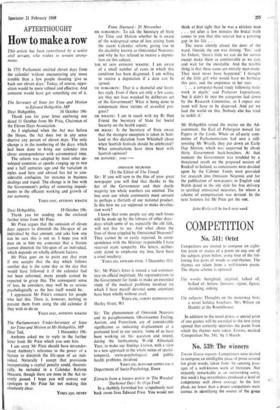How to make a row
AFTERTHOUGHT
This article has been contributed by a senior civil servant, who wishes to remain anony- mous.
In 1751 Parliament omitted eleven days from the calendar without encountering any more trouble than a few people shouting 'give us back our eleven days.' Today, of course, oppo- sition would be more refined and effective. And someone would have got something out of it.
The Secretary of State for Time and Motion to Edward Hobgoblin, MP
Dear Hobgoblin, 10 October 196- Thank you for your letter enclosing one dated II October from Mr Pixie, Chairman of the Eleven Days Association.
As I explained when the Act was before the House, the Act does not in any sense deprive any person of eleven days. The only change is in the numbering of the days, which had been done to bring our calendar into closer correspondence with astronomical time.
The reform was adopted by most other de- veloped countries at epochs ranging up to two and a half centuries ago and the variation in styles used here and abroad has led to con- siderable confusion, for instance in business dealings and travel. The change is in line with the Government's policy of removing impedi- ments to the efficient working and growth of our economy.
Yours ever, ANTHONY WRAITH


































 Previous page
Previous page